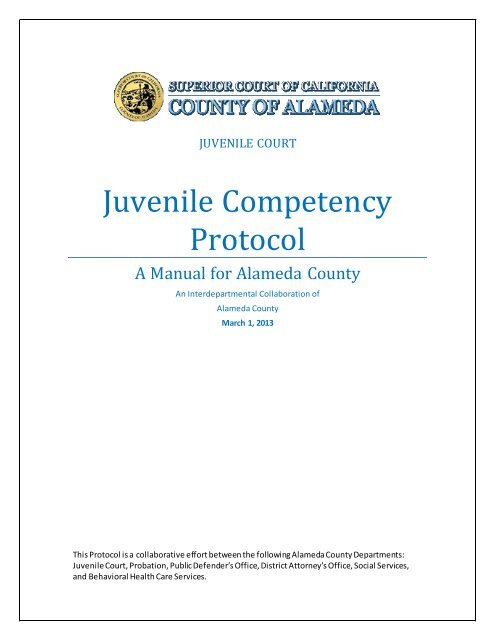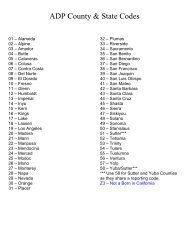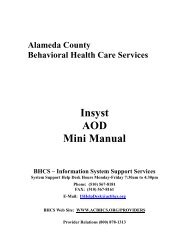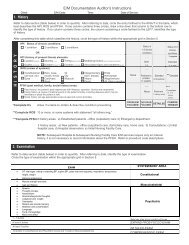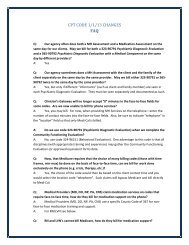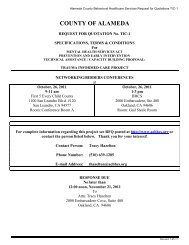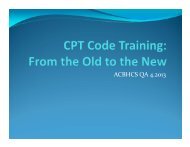Juvenile Competency Protocol - Alameda County Behavioral Health
Juvenile Competency Protocol - Alameda County Behavioral Health
Juvenile Competency Protocol - Alameda County Behavioral Health
Create successful ePaper yourself
Turn your PDF publications into a flip-book with our unique Google optimized e-Paper software.
JUVENILE COURT<br />
<strong>Juvenile</strong> <strong>Competency</strong><br />
<strong>Protocol</strong><br />
A Manual for <strong>Alameda</strong> <strong>County</strong><br />
An Interdepartmental Collaboration of<br />
<strong>Alameda</strong> <strong>County</strong><br />
March 1, 2013<br />
This <strong>Protocol</strong> is a collaborative effort between the following <strong>Alameda</strong> <strong>County</strong> Departments:<br />
<strong>Juvenile</strong> Court, Probation, Public Defender’s Office, District Attorney’s Office, Social Services,<br />
and <strong>Behavioral</strong> <strong>Health</strong> Care Services.
<strong>Juvenile</strong> <strong>Competency</strong> <strong>Protocol</strong> Committee<br />
Superior Court of California, <strong>Alameda</strong> <strong>County</strong> <strong>Juvenile</strong> Court,<br />
Judge Rhonda Burgess, Presiding Judge, <strong>Juvenile</strong> Court<br />
<strong>Alameda</strong> <strong>County</strong> Public Defender’s Office<br />
Attorney Aundrea Brown, Assistant Public Defender<br />
Attorney Tony Cheng, Public Defender’s Office of <strong>Alameda</strong> <strong>County</strong><br />
<strong>Alameda</strong> <strong>County</strong> District Attorney’s Office<br />
Attorney Matthew Golde, Assistant District Attorney<br />
Attorney Cheryl Poncini, Office of the District Attorney, <strong>Alameda</strong> <strong>County</strong><br />
<strong>Alameda</strong> <strong>County</strong> Office of Probation<br />
Esa Ehmen-Krause, Deputy Chief Probation Officer, <strong>Juvenile</strong> Facilities<br />
Mark Soohoo, <strong>Juvenile</strong> Court Officer/Deputy Probation Officer 3<br />
<strong>Alameda</strong> <strong>County</strong> Social Services Agency<br />
Michelle Love, Assistant Agency Director Children and Family Services<br />
Gumaro Garay, MPA, MSW, Division Director<br />
<strong>Alameda</strong> <strong>County</strong> <strong>Behavioral</strong> <strong>Health</strong> Care Services<br />
Jeff Rackmil, LCSW, Assistant Director, Children’s Services<br />
Lisa Carlisle, MA. M.Ed, Program Specialist, Children’s Services<br />
Janice Thomas, Ph.D, Clinical Psychologist, Guidance Clinic, <strong>Juvenile</strong> Justice Center<br />
Yahru T. Baruti, LCSW Senior Psychiatric Social Worker, Guidance Clinic, <strong>Juvenile</strong><br />
Justice Center<br />
Doree Griffin, Ph.D. Senior Clinical Psychologist, Guidance Clinic, <strong>Juvenile</strong> Justice<br />
Center<br />
1 Superior Court, <strong>Alameda</strong> <strong>County</strong>, California<br />
<strong>Juvenile</strong> Court, <strong>Juvenile</strong> <strong>Competency</strong> <strong>Protocol</strong><br />
March 1, 2013
TABLE OF CONTENTS<br />
SECTION ONE Page 3<br />
Introduction and Scope<br />
SECTION TWO Page 7<br />
Initiation of <strong>Competency</strong> Proceeding<br />
SECTION THREE<br />
<strong>Juvenile</strong> <strong>Competency</strong> Forensic Evaluation<br />
Page11<br />
SECTION FOUR Page 13<br />
Return of Pre-Trial <strong>Competency</strong> Evaluator Report<br />
SECTION FIVE Page 14<br />
<strong>Competency</strong> Trial<br />
SECTION SIX Page 17<br />
Steps Following Post-Trial Finding<br />
SECTION SEVEN Page 19<br />
Program for Restoration of <strong>Competency</strong><br />
SECTION EIGHT Page 19<br />
Periodic Competence Restoration Reviews<br />
SECTION NINE Page 21<br />
Outcome of Restoration Plan<br />
2 Superior Court, <strong>Alameda</strong> <strong>County</strong>, California<br />
<strong>Juvenile</strong> Court, <strong>Juvenile</strong> <strong>Competency</strong> <strong>Protocol</strong><br />
March 1, 2013
SECTION ONE<br />
INTRODUCTION AND SCOPE<br />
Summary<br />
When a juvenile delinquency judge believes a minor may be incompetent to enter<br />
a plea/stipulation and withstand trial or be adjudicated (because the minor does not<br />
understand the court process or cannot effectively communicate with his/her attorney),<br />
the court must suspend the proceedings. The proceedings are suspended because it is<br />
unjust to subject a person to a court process the person is not competent to understand.<br />
The steps in most competency cases: first, a doubt is raised. Next, the court<br />
conducts an initial inquiry process. If the court finds there is “substantial evidence” of<br />
doubt regarding the minor being competent, the proceeding is suspended. The court<br />
orders the minor’s competency evaluated by a <strong>Competency</strong> Evaluator. Following the<br />
court-ordered competency evaluation, the court will seek a stipulation from the parties<br />
that the minor is either competent or incompetent. If there is no stipulation, there will be<br />
a trial to determine if the minor is competent. Following the potential stipulation or trial,<br />
the judge makes a finding regarding the minor’s competence or incompetence. If the<br />
minor is deemed competent, the underlying juvenile case is no longer suspended and may<br />
proceed. If the judge finds the minor incompetent, regular juvenile proceedings remain<br />
suspended. There will be periodic reviews to see if the minor has attained competency.<br />
If the minor attains competency, the underlying proceeding is no longer suspended and<br />
the case begins again, where it left off. If the minor does not attain competency, the<br />
underlying proceeding remains suspended for a period of time that is no longer than<br />
reasonably necessary to determine where there is a substantial probability that the minor<br />
will attain competency in the foreseeable future or the court no longer retains jurisdiction.<br />
W&I §709(c)<br />
Scope<br />
This <strong>Protocol</strong> of the <strong>Juvenile</strong> Court of <strong>Alameda</strong> <strong>County</strong>, provides an overview of<br />
procedures for determining a minor’s mental ability to participate in juvenile<br />
proceedings, the evaluation of a minor, the competency hearing process, the attempt to<br />
obtain/restore competency, judicial review, and the steps to take when the minor is either<br />
found to be competent or not competent. This <strong>Protocol</strong> shall not be used to determine a<br />
minor’s mental state at the time of the alleged offense(s) for which the minor is accused.<br />
Legal Overview<br />
In all cases, if the court, or minor’s attorney has a reason to doubt whether the<br />
minor is competent to enter a plea/stipulation or withstand trial, the issue should be raised<br />
at the earliest possible point in the regular juvenile proceeding. Once raised, the judge<br />
has an obligation to determine if the minor is possibly incompetent.<br />
Judge must exercise proper discretion and must make the initial decision whether<br />
to proceed toward a competency hearing or not, and, if there is a competency hearing,<br />
3 Superior Court, <strong>Alameda</strong> <strong>County</strong>, California<br />
<strong>Juvenile</strong> Court, <strong>Juvenile</strong> <strong>Competency</strong> <strong>Protocol</strong><br />
March 1, 2013
whether the minor is competent or not. Oftentimes, the judge has within the courtroom<br />
many resources (the lawyers, probation officers, minor, minor’s family members) upon<br />
which the court may make an initial decision to temporarily suspend proceedings.<br />
If the judge declares a doubt regarding the minor’s competency, proceedings must<br />
be temporarily suspended, an expert must be appointed to evaluate the minor’s<br />
competency, and the matter must proceed toward a competency trial. If the judge finds<br />
the minor competent following the trial, the underlying juvenile proceedings are resumed<br />
and the minor enters a plea/stipulation or is tried on the petition. A minor who is found<br />
to be incompetent following a competency hearing will continue to have his/her matter<br />
suspended while the court orders a competency Restoration Plan. If the minor’s<br />
competence is restored, the underlying juvenile proceedings resume. If the minor’s<br />
competence is not restored, the matter is either continued until such time as competency<br />
can be restored/obtained, or the petition should be dismissed.<br />
4 Superior Court, <strong>Alameda</strong> <strong>County</strong>, California<br />
<strong>Juvenile</strong> Court, <strong>Juvenile</strong> <strong>Competency</strong> <strong>Protocol</strong><br />
March 1, 2013
<strong>Competency</strong> Process Overview<br />
I. A doubt is raised: Determine if substantial evidence of doubt regarding potential<br />
incompetency exists. (At a minimum ask minor’s attorney about competency;<br />
review any prior psychological reports; talk to parents and probation officers.)<br />
1. If substantial evidence of doubt does not exist, continue with<br />
underlying juvenile proceedings.<br />
2. If substantial evidence of doubt does exist:<br />
a. State doubt on the record.<br />
b. Suspend juvenile proceedings.<br />
c. Appoint a Pre-Trial <strong>Competency</strong> Evaluator through<br />
<strong>Alameda</strong> <strong>County</strong> <strong>Behavioral</strong> <strong>Health</strong> Care Services (BHCS)<br />
from the BHCS Guidance Clinic or BHCS Psychologists<br />
panel.<br />
d. Consider custody status of minor (determine whether or not<br />
there is information that would change current status). Use<br />
least restrictive setting consistent with detention risk factors<br />
re: safety of minor and community.<br />
e. Set two future court dates:<br />
Fifteen (15) business days for receipt of evaluator’s<br />
report in court;<br />
Twenty (20) business days for <strong>Competency</strong> Review<br />
f. At the <strong>Competency</strong> Review Hearing, the parties can<br />
stipulate, submit, or set for a contested trial. If contested<br />
trial, set within fifteen (15) business days.<br />
II.<br />
Upon receipt of <strong>Competency</strong> Evaluator’s opinion, if parties stipulate or submit<br />
and/or Court finds minor is competent short of a trial, the court will:<br />
1. Reinstate juvenile proceedings<br />
2. Remind probation that the court intends to grant credits toward<br />
maximum time of confinement, if any, at time of Disposition. Since<br />
accrual of confinement time credits tolls while proceedings are<br />
suspended.<br />
3. Consider need for possible psychological evaluation to determine what<br />
mental health services the minor may need even though the minor is<br />
competent.<br />
4. Set date of jurisdictional hearing.<br />
5 Superior Court, <strong>Alameda</strong> <strong>County</strong>, California<br />
<strong>Juvenile</strong> Court, <strong>Juvenile</strong> <strong>Competency</strong> <strong>Protocol</strong><br />
March 1, 2013
III.<br />
If there is a <strong>Competency</strong> Trial, it proceeds as follows:<br />
1. Minor is presumed competent. Burden of proof lies with minor.<br />
2. Standard: preponderance of evidence<br />
3. Any judge can hear the trial; does not need to be the judge who<br />
declared doubt.<br />
4. Minor has no independent right to testify; defense counsel can choose<br />
not to call the minor as a witness even if the minor wants to testify.<br />
IV. Following <strong>Competency</strong> Trial, if the court finds minor is competent: refer to II (1)<br />
above.<br />
V. Following competency trial, if the court finds minor is incompetent:<br />
1. Within 7-10 business days, set a date for receipt of preliminary<br />
competency Restoration Plan. (The restoration plan recommended by<br />
the evaluator in the current evaluation may be used, provided the<br />
parties agree.)<br />
2. Within thirty (30) business days, the court will conduct/hear a progress<br />
report regarding implementation of the competency restoration plan.<br />
a. If appropriate, court will order a Multidisciplinary Team<br />
(MDT) for determination of necessary Ancillary Services. Set<br />
subsequent (if necessary) ninety (90) day review hearings will<br />
to determine if minor has been restored to competency.<br />
b. Judicial standard of review: In every case, if a minor is found<br />
incompetent by a preponderance of the evidence, all<br />
proceedings shall remain suspended for a period of time that is<br />
no longer than reasonably necessary to determine whether there<br />
is a substantial probability that the minor will attain<br />
competency in the foreseeable future, or the court no longer<br />
retains jurisdiction. (W&I §709(c))<br />
3. If there is a Contested Restoration to <strong>Competency</strong> Trial<br />
a. Minor is presumed competent. Burden of proof lies<br />
with minor.<br />
b. Standard: preponderance of evidence<br />
c. Following Restoration trial, if the Court finds minor is<br />
competent, refer to II, (1) above<br />
d. If the Court finds minor has not obtained competency,<br />
determine if attainment is likely to be achieved in the<br />
foreseeable future. If yes, return to restoration plan and<br />
refer to V, (1) above. If not, see next Section Seven.<br />
4. If at any point the court does not find a substantial probability the<br />
minor is likely to attain competency in the foreseeable future, the court<br />
should dismiss the case.<br />
e. Before the case is dismissed, the D.A. has the right to<br />
10 calendar days notice and a trial to prove there is not<br />
6 Superior Court, <strong>Alameda</strong> <strong>County</strong>, California<br />
<strong>Juvenile</strong> Court, <strong>Juvenile</strong> <strong>Competency</strong> <strong>Protocol</strong><br />
March 1, 2013
substantial probability the minor is unlikely to attain<br />
competency in the foreseeable future.<br />
f. If the case is dismissed, court jurisdiction ends.<br />
g. The court may consider a referral to Probate Court.<br />
During all competency proceedings, minors have the right to an attorney.<br />
Because the policy of the <strong>Juvenile</strong> Court in <strong>Alameda</strong> <strong>County</strong> is that each minor is<br />
afforded a public attorney at arraignment, all minors have legal representation throughout<br />
their entire case, including any possible competency proceedings.<br />
Although informal solutions should be sought and promoted, there shall be no ex<br />
parte communications in any competency matter unless there is a stipulation to proceed<br />
with limited ex parte communications. Such stipulations will have to be agreed upon on<br />
a case by case basis and placed on the record.<br />
A minor who wants to attend court hearings may come to court hearings.<br />
The minor should be evaluated and receive services in the least restrictive setting<br />
that is practical.<br />
The <strong>Juvenile</strong> Court maintains jurisdiction of the minor during all competency<br />
proceedings.<br />
SECTION TWO<br />
INITIATION OF A COMPETENCY PROCEEDING<br />
Welfare & Institute Code §709(a) states: “During the pendency of any juvenile<br />
proceeding, the minor’s counsel or the court may express a doubt as to the minor’s<br />
competency.”<br />
The juvenile court has an obligation to determine if a minor is competent to enter<br />
a plea/stipulation or withstand trial. A person cannot be tried or sentenced while<br />
mentally incompetent. Penal Code §1367(a); Godinez v Moran (1993) 509 US 389, 396;<br />
Pate v Robinson (1966) 383 US 375, 378; People v Hayes (1992) 21 C4th 1211, 1281.<br />
[Adult statute and cases.]<br />
The Court does not automatically begin competency proceedings just because<br />
someone asks for such proceedings. Before competency proceedings begin in juvenile<br />
court, a judge must have an objective doubt that minor may be incompetent. If the judge<br />
has such a doubt, competency proceedings are initiated. If the judge does not have such a<br />
doubt, competency proceedings are not initiated. This section explains how a judge<br />
conducts the initial inquiry to determine if there is a substantial evidence to suspend the<br />
underlying juvenile proceedings and commence competency proceedings.<br />
7 Superior Court, <strong>Alameda</strong> <strong>County</strong>, California<br />
<strong>Juvenile</strong> Court, <strong>Juvenile</strong> <strong>Competency</strong> <strong>Protocol</strong><br />
March 1, 2013
<strong>Competency</strong> Defined<br />
The standards for determining whether a person in presently competent to enter a<br />
plea, stand trial, or be sentenced, are as follows:<br />
W&I Code §709(a) states:<br />
“A minor is incompetent to proceed if he or she lacks<br />
sufficient present ability to consult with counsel and<br />
assist in preparing his or her defense with a reasonable<br />
degree or rational understanding, or lacks a rational as<br />
well as factual understanding, of the nature of the charges<br />
or proceedings against him or her.”<br />
If the court finds substantial evidence raises a doubt as to the minor’s<br />
competency, the proceedings shall be suspended.<br />
<br />
<br />
<br />
The person must be presently capable of understanding the nature and purpose of<br />
the proceedings;<br />
The person must presently comprehend his or her own status and condition in<br />
reference to the proceedings; and<br />
The person must be presently able to assist his or her attorney in conducting a<br />
defense. Penal Code §1367(a); People v Conrad (1982) 132 CA3d 361, 369.<br />
[Adult case]<br />
The “test must be whether he has sufficient present ability to consult with his lawyer with<br />
a reasonable degree of rational understanding – and whether he has a rational as well as<br />
factual understanding of the proceedings against him.” Dusky v United States (1960) 362<br />
US 402 [Adult case]<br />
The case of Timothy J. added a new component to competency in juvenile cases:<br />
developmental immaturity. “A minor is mentally incompetent if, as a result of mental<br />
disorder, developmental disability, or developmental immaturity, the minor is unable to<br />
understand the nature of the present juvenile court proceeding, or to assist counsel in the<br />
conduct of a defense in a rational manner.” Penal Code §1361(a); Timothy J. v Superior<br />
Court (2007) 150 Cal.App4th 847.<br />
All inquiry by the court shall be on the record.<br />
8 Superior Court, <strong>Alameda</strong> <strong>County</strong>, California<br />
<strong>Juvenile</strong> Court, <strong>Juvenile</strong> <strong>Competency</strong> <strong>Protocol</strong><br />
March 1, 2013
The Actual Initial Process<br />
Judge’s Inquiry<br />
If the judge is the first to doubt whether the minor is competent to enter a<br />
plea/stipulation or be tried, the judge must raise the issue of competence. The trial judge,<br />
on his or her own motion, may inquire into the minor’s mental capacity to stand trial<br />
whenever evidence presented prior to disposition raises a bona fide doubt. The doubt that<br />
triggers the trial judge’s obligation to order a hearing is not subjective, but rather<br />
determined objectively from the record. People v. Stiltner (1982) 132CA3d. 216,222.<br />
Defense Counsel’s Doubt<br />
Defense counsel may raise a doubt as to the minor’s competency. Court must<br />
assess whether counsel is merely commenting of the minor’s mental state or requesting a<br />
competency hearing under §709. If counsel is requesting a competency hearing pursuant<br />
to §709, this triggers the judge’s duty to conduct an initial inquiry whether there is good<br />
cause to commence competency proceedings. The competency proceedings are not<br />
commenced simply because there is a request.<br />
Regardless of who raises the issue of competency, the judge must make the initial<br />
inquiry if there is reason to believe competency may be at issue. The court should err on<br />
the side of conducting an initial inquiry.<br />
Inclusion of Defense Counsel<br />
If any person (such as a deputy district attorney, probation officer, family<br />
member, or probation court officer) believes the minor may be incompetent, that person<br />
should relay the belief to the defense counsel. If the issue is raised to the court, the judge<br />
should relay the information to defense counsel. Defense counsel can then apply the<br />
legal standards to the situation and make a determination whether to advise the court of<br />
potential incompetency<br />
Defense counsel is better able to collect information directly from his/her client,<br />
and observe the minor in an informal setting, such as an interview room. Defense<br />
counsel also needs to make strategic decisions regarding whether they should ask for a<br />
continuance, check on the minor’s medications or determine if the minor is in a<br />
temporary crisis.<br />
Judge Required to Exercise Discretion<br />
W&I Code §709(a) makes it clear that the judge must first find “substantial<br />
evidence” that “raises a doubt as the minor’s competency” before suspending<br />
proceedings. Proceedings are not suspended solely on an attorney’s request or upon an<br />
attorney stating the minor is incompetent.<br />
Talk to the Defense Attorney<br />
Defense counsel’s expression of an opinion of minor’s mental competence under<br />
does not violate the attorney-client privilege (Evid Code §954). Although the attorney’s<br />
opinion of competence may be principally drawn from confidential communications with<br />
9 Superior Court, <strong>Alameda</strong> <strong>County</strong>, California<br />
<strong>Juvenile</strong> Court, <strong>Juvenile</strong> <strong>Competency</strong> <strong>Protocol</strong><br />
March 1, 2013
the client, merely giving the opinion does not reveal any protected information. People v<br />
Bolden (1979) 99CA3d 375, 378. The court should avoid breaching any specific<br />
attorney-client privilege, but general questions about counsel’s observations and<br />
conversations with the minor are recommended.<br />
The court may, but is not required to, allow defense counsel to present his or her<br />
opinion regarding minor’s competency in camera if the court finds that there is a reason<br />
to believe that attorney-client privileged information will be inappropriately revealed if<br />
the hearing is conducted in open court. Cal Rules of Ct, Rule 4.130(b)(2). [Adult rule]<br />
Regional Center Assessment<br />
The court can consider whether there has previously been an assessment of<br />
competency and/or restoration of competency through the State Regional Center for<br />
persons who are developmentally disabled. Collecting past information from the<br />
Regional Center may help determine if the minor may be currently incompetent to<br />
withstand trial. W&I §709 (e) – (h)<br />
Retroactive Determination Not Required<br />
The court must only determine a minor’s current competency. Penal Code<br />
§709(a) conforms to all previous statutes and case law on this issue. It states “A minor is<br />
incompetent to proceed if he or she lacks sufficient present ability…”<br />
What Constitutes Substantial Evidence<br />
The question of what constitutes substantial evidence of a minor’s incompetence<br />
cannot be answered by a simple formula applicable to all situations. People v Laudermilk<br />
(1967) 67 C2d 272, 283. Evidence is substantial if it raises a reasonable or bona fide<br />
doubt concerning the minor’s ability to understand the nature of the juvenile proceedings<br />
against him or her, or assist in his or her defense. People v Rogers (2006) 39 C4th 826,<br />
847; People v Hayes (1999) 21 C4th 1211, 1282 (judge properly denied defendant’s<br />
motion for competency hearing). Substantial evidence is not just any evidence that<br />
supports the possible fact. Substantial evidence requires evidence that is “reasonable in<br />
nature, credible and of solid value.” Bowers v Bernards (1984) 150 Cal.App.3D 870,<br />
873. [All cases in this section are adult cases]<br />
Even if the court finds the minor to be competent, if the court suspects the minor<br />
may have a developmental disability, the court may refer the minor to the Regional<br />
Center, if deemed appropriate. (W&I §709 (e) – (h))<br />
Advise the Minor of His or Her Rights<br />
The minor needs to be advised of his/her rights concerning competency<br />
proceedings. Although in some case a minor may not have the capacity to understand<br />
his/her rights, an attempt should be made to advise each minor. If the minor does not<br />
have the capacity to understand his/her rights, the court shall nonetheless continue with<br />
the competency proceedings.<br />
10 Superior Court, <strong>Alameda</strong> <strong>County</strong>, California<br />
<strong>Juvenile</strong> Court, <strong>Juvenile</strong> <strong>Competency</strong> <strong>Protocol</strong><br />
March 1, 2013
Suspend Proceedings<br />
Once the court orders a competency hearing, the juvenile proceedings must be<br />
suspended until a trial on the minor’s competency has been concluded and the minor<br />
either is found mentally competent or has his or her competency restored. Welfare &<br />
Institutions Code §§ 709 and 6551 [<strong>Juvenile</strong> statutes]<br />
SECTION THREE<br />
JUVENILE COMPETENCY FORENSIC EVALUATION<br />
If the court finds that “substantial evidence raises a doubt as to a minor’s<br />
competency, the underlying delinquency case is suspended, and the matter is heading<br />
toward a competency trial, the court must order that a competency evaluation be<br />
performed prior to the trial.<br />
W&I Code §709(b) states<br />
“The court shall appoint an expert to evaluate whether the<br />
minor suffers from a mental disorder, developmental<br />
disability, developmental immaturity, or other condition<br />
and, if so, whether the condition or conditions impair the<br />
minor’s competency.”<br />
Calendaring Future Court Hearings<br />
On the day the court orders a Pre-Trial <strong>Competency</strong> Evaluation, the clerk of the<br />
court will contact the Chief of the Guidance Clinic who will assign a <strong>Competency</strong><br />
evaluator to the case from the list of approved evaluators. The Chief of the Guidance<br />
Clinic, within 48 hours will assign the case to an evaluator who is available and able to<br />
provide a timely report within time requirements and constraints of the particular case.<br />
Two days prior to the date the report shall be received in court, the Pre-Trial<br />
<strong>Competency</strong> Evaluator will deliver the completed report to the court clerk’s office for<br />
distribution to the appropriate trial court.<br />
Pre-Trial <strong>Competency</strong> Evaluator Qualifications<br />
W&I Code §709(b) states:<br />
“The expert shall have expertise in child and adolescent<br />
development, and training in the forensic evaluation of<br />
juveniles, and shall be familiar with competency standards<br />
and accepted criteria used in evaluating competence.<br />
11 Superior Court, <strong>Alameda</strong> <strong>County</strong>, California<br />
<strong>Juvenile</strong> Court, <strong>Juvenile</strong> <strong>Competency</strong> <strong>Protocol</strong><br />
March 1, 2013
Court Instructions to Pre-Trial <strong>Competency</strong> Evaluator<br />
Upon each appointment of a Pre-Trial <strong>Competency</strong> Evaluator, the <strong>Juvenile</strong><br />
Court’s Clerk shall issue appropriate instructions by way of a cover letter to the Pre-<br />
Trial <strong>Competency</strong> Evaluator. (Even if the evaluator has done numerous competency<br />
evaluations for the court in the past.)<br />
Referral to Pre-Trial <strong>Competency</strong> Evaluator<br />
When a Pre-Trial <strong>Competency</strong> Evaluation is ordered by the court, the <strong>Juvenile</strong><br />
Court Clerk will prepare a packet containing orders and cover letter instructions for the<br />
Court-Appointed <strong>Competency</strong> Evaluator. The Probation Court Officer will provide the<br />
relevant documents to the Guidance Clinic within 48 hours.<br />
This packet will include the following:<br />
1. Court instructions for the Pre-Trial <strong>Competency</strong> Evaluator (cover Letter);<br />
2. Court order indicating all documents from Probation, the court, police<br />
departments, and previous evaluators are confidential; that they cannot be shared<br />
with third parties without court order;<br />
3. Court order for the Pre-Trial <strong>Competency</strong> Evaluation;<br />
4. Name of judge and department to which the evaluator will be reporting;<br />
5. Date for Receipt of the court ordered evaluation.<br />
Separately Retained Experts<br />
Defense counsel or the District Attorney may retain their own expert(s). Any<br />
assessment reports obtained by the defense attorney shall be confidential unless the<br />
expert may testify during the competency hearing or the report is otherwise discoverable.<br />
If the attorneys will possibly use an expert in trial, counsel must provide copies of the<br />
expert’s report and resume to opposing counsel well before trial. If the District Attorney<br />
has any possible Brady material, the deputy district attorney must provide copies to the<br />
defense well before trial. All efforts shall be made by the attorneys to avoid delay in the<br />
competency proceedings.<br />
If the minor desires to present testimony of a psychiatrist or psychologist of his or<br />
her own choosing, the court may not place conditions on the admission of the testimony,<br />
such as the minor’s cooperation with the Pre-Trial <strong>Competency</strong> Evaluator. People v<br />
Mayes (1988) 202 Cal App. 3 rd 908<br />
The court does not pay for the defense or prosecutions experts.<br />
12 Superior Court, <strong>Alameda</strong> <strong>County</strong>, California<br />
<strong>Juvenile</strong> Court, <strong>Juvenile</strong> <strong>Competency</strong> <strong>Protocol</strong><br />
March 1, 2013
SECTION FOUR<br />
RETURN OF PRE-TRIAL COMPETENCY EVALUATOR REPORT<br />
Two days before the date scheduled for Receipt of the <strong>Competency</strong> report, the<br />
competency evaluation will be delivered to the Court Clerk’s Office for distribution to<br />
the appropriate trial court. The court clerk in the trial department will distribute copies of<br />
the confidential report to: the judge, probation court officer, defense counsel and the<br />
deputy district attorney. Cal Rules of Ct, Rule 4.130(d)(2).<br />
The report is circulated to the parties at the hearing for Receipt of the <strong>Competency</strong><br />
evaluation. At this hearing, three things can happen: the parties can stipulate to the<br />
opinion of the Pre-Trial <strong>Competency</strong> Evaluator, the parties can submit on the opinion, or<br />
the parties can contest the opinion, and set the matter for a contested competency hearing.<br />
1. The parties can stipulate to the findings of the Pre-Trial <strong>Competency</strong><br />
Evaluator. The court need not accept the stipulation. Absent a stipulation,<br />
canceling the competency trial, based upon the minor being competent<br />
should be done with caution. There must be a solid foundation to support<br />
that the “substantial evidence” that warranted the need for a competency<br />
hearing no longer exist. An erroneous denial of competency compels<br />
reversal of the judgment, because the trial court has no power to proceed<br />
with an underlying trial once a doubt arises about a person’s competence.<br />
People v Pennington (1967) 66 C2d 508, 521. The error is per se<br />
prejudicial and may not be cured by a retrospective determination of the<br />
person’s mental competence during the regular trial. People v Stankewitz<br />
(1982) 32 Cal.3d 80. [Adult cases.]<br />
If the court does not accept the stipulation of the parties, the court should<br />
set a <strong>Competency</strong> Trial. At the trial, the parties could still stipulate to the<br />
Pre-Trial <strong>Competency</strong> Evaluator’s report, and the court would make<br />
whatever findings the court deems appropriate at the hearing. The<br />
<strong>Competency</strong> Trial could be set in a relatively brief time because there<br />
would be no evidence or argument for the attorneys to prepare. The court<br />
presumably could hear the <strong>Competency</strong> Trial that day.<br />
2. The parties can submit the matter to the court for a court determination<br />
based on the Pre-Trial <strong>Competency</strong> Evaluator’s report(s). Basically, the<br />
parties would not be taking position and leaving it up to the court to<br />
decide. The court would need to set a formal <strong>Competency</strong> Trial, or obtain<br />
a stipulation from the parties that the court can issue written findings and<br />
orders without the need for a formal <strong>Competency</strong> Trial. In this case, the<br />
judge would take matter under submission. The judge can issue an oral<br />
decision on the record that day, or submit a written decision shortly<br />
thereafter.<br />
13 Superior Court, <strong>Alameda</strong> <strong>County</strong>, California<br />
<strong>Juvenile</strong> Court, <strong>Juvenile</strong> <strong>Competency</strong> <strong>Protocol</strong><br />
March 1, 2013
If either party wants a trial, or the judge wants a trial, and there are only<br />
submissions to the Pre-Trial <strong>Competency</strong> Evaluator’s report, the<br />
<strong>Competency</strong> Trial could be set in a relatively brief time because there<br />
would be no evidence or argument for the attorneys to prepare. The court<br />
could hear the <strong>Competency</strong> Trial that day.<br />
3. The parties can disagree about the Pre-Trial <strong>Competency</strong> Evaluator’s<br />
opinion. The court would set a contested <strong>Competency</strong> Trial. The trial<br />
could proceed by submission on some matters, stipulation on some<br />
matters, live testimony, and/or legal argument. The contested trial would<br />
be set within fifteen (15) calendar days, subject to an extension for good<br />
cause.<br />
When the Court Finds the Minor Competent After Receipt of the Pre-Trial<br />
<strong>Competency</strong> Evaluator <strong>Competency</strong> Report<br />
If the minor is competent and in-custody, the minor will continue to receive the<br />
level of care determined appropriate by the court. If the minor is not in-custody, the<br />
Probation Department will recommend and the court may order appropriate referrals for<br />
mental health treatment, if indicated.<br />
The court or attorneys may also consider a referral to the <strong>Alameda</strong> <strong>County</strong><br />
Collaborative Court which focuses on maintaining the minor at home and treating mental<br />
conditions or disorders. If the court suspects the minor may have a developmental<br />
disability, or the Pre-Trial <strong>Competency</strong> Evaluator opines the minor may have a<br />
developmental disability, the court may refer the minor to the Regional Center for an<br />
evaluation.<br />
COMPETENCY TRIAL<br />
SECTION FIVE<br />
W&I Code §709(b) states “Upon suspension of proceedings, the court shall order<br />
that the question of the minor’s competence be determined at a hearing.”<br />
Regardless of the conclusions or opinions of the court-appointed Pre-Trial<br />
<strong>Competency</strong> Evaluator, the court that has initiated mental competency proceedings based<br />
upon “substantial evidence of doubt” must conduct a trial on the minor’s competency,<br />
unless there is a stipulation to not have such a hearing, and the judge adopts the<br />
stipulation. Rules of Court, Rule 4.130(e)(1).<br />
Timing of Trial<br />
For a contested <strong>Competency</strong> Trial, the court must set the trial within fifteen (15)<br />
business days from the Receipt of <strong>Competency</strong> Review, unless there is good cause to<br />
extend the time for a short period to accommodate the availability of the expert<br />
witness(es) or to allow for completion of the new evaluations. If the expert(s) needs to be<br />
available for trial, scheduling would have to be coordinated.<br />
14 Superior Court, <strong>Alameda</strong> <strong>County</strong>, California<br />
<strong>Juvenile</strong> Court, <strong>Juvenile</strong> <strong>Competency</strong> <strong>Protocol</strong><br />
March 1, 2013
De facto good cause would exist for a reasonable continuance if an attorney needs<br />
time to secure his/her own expert to render a second opinion. The court must limit the<br />
amount of time for the continuance to avoid delay. If the attorney securing the second<br />
opinion does not work with haste, the court may proceed to trial without counsel’s<br />
expert(s). Also, the court should be prudent in continuing trial dates any longer than<br />
absolutely necessary when the minor is in custody.<br />
Trial Judge<br />
There is no requirement that the competency hearing be held before the same<br />
judge who declared a doubt about the minor’s competence to stand trial. People v Hill<br />
(1967) 67 C2d 105, 113; People v Lawley (2002) 27 24 th 102, 133-134. [Adult cases.]<br />
Presumption of Competence; Burden of Proof<br />
The minor is presumed competent at the start of the competency hearing. The<br />
burden in on the minor to prove his or her incompetence to stand trial by a preponderance<br />
of the evidence. W&I Code 709; Penal Code §1369(f0; Cal Rules of Ct 4.130(e)(2);<br />
Medina v California (1992) 505 US 437; People v Medina (1990) 51 C3d 870, 885<br />
(presumption and burden of proof under Penal Code §1369(f) do not violate due process);<br />
People v Samuel (1981) 27 C3d 489, 505, CALCRIM 3451. A preponderance of<br />
evidence is “that which preponds,” or is more likely than not, or is more then 50 percent<br />
true.<br />
However, if the defense puts on no evidence of the minor’s incompetence and the<br />
prosecution chooses to put on such evidence, the burden of proof falls on the prosecution.<br />
Penal Code §1369(b)(2); Cal Rules of Ct 4.130(e)(2); People v Mixon (1990) 225 CA3d<br />
1471, 1484 n12 (burden of proof falls on party who challenges presumption. [<strong>Juvenile</strong><br />
and adult statues, cases, and Rule of Court.]<br />
When neither the prosecution nor the minor seeks a finding of incompetence, the<br />
trial court may take the initiative and assume the burden of producing evidence of<br />
incompetence. People v Skeirik (1991) 229 CA3d 444, 459. [Adult cases.]<br />
Presentation of Evidence<br />
Typical order of presentation:<br />
1. Defense counsel goes first because they carry the burden of proof.<br />
The minor’s attorney offers evidence of the minor’s mental<br />
incompetence, if the attorney has such evidence, and chooses to do<br />
so. Penal Code 1369(b)(1).<br />
2. If defense counsel does not offer evidence of incompetence, the<br />
prosecutor may do so. Penal Code 1369(b)(2).<br />
3. If defense counsel put on evidence of incompetence, the prosecutor<br />
next offers evidence of minor’s present mental competence. Penal<br />
Code 1369(c ).<br />
4. Each party may offer rebuttal testimony, unless the court, for good<br />
reason and in the furtherance of justice, also permits other<br />
evidence in support of the original contention. Penal Code<br />
1369(d).<br />
15 Superior Court, <strong>Alameda</strong> <strong>County</strong>, California<br />
<strong>Juvenile</strong> Court, <strong>Juvenile</strong> <strong>Competency</strong> <strong>Protocol</strong><br />
March 1, 2013
5. The prosecution makes its final argument, if any followed by the<br />
defense counsel’s final argument, if any. The parties may submit<br />
the case without final argument. Penal Code 1339(e). [Adult<br />
statues.]<br />
Minor Has No Right to Testify<br />
If the subject of a competency trial wants to testify, but his/her attorney does not<br />
want the person to testify, the subject of the trial has no right to testify. Sometimes<br />
defense counsel leaves it up to the minor to decide whether to testify or not, and defense<br />
counsel merely puts his/her statement on the record that “it is against advise of counsel<br />
for my client to testify, but I leave it up to my client; I am not objecting to his testimony.”<br />
However, if defense counsel objects to the minor testifying, and asks the court to not<br />
allow minor to testify, the court should not allow the minor to testify. People v Johnny<br />
Lee Bell (2010) 184 Cal.App.4 th 1071 [error for court to allow Mr. Bell to testify over<br />
defense counsel’s objection, but it was harmless error.][Adult case.]<br />
Defense Counsel Can Disagree with Minor<br />
Defense Counsel may present evidence of the minor’s incompetence even when<br />
the minor desires to be found competent. People v Stanley (1995) 10 C4th 764, 804;<br />
People v Bolden (1979) 99 CA3d 378, 379 (defense counsel must advocate the position<br />
that he or she perceives to be in the minor’s best interests even when that interest<br />
conflicts with the minor’s stated position). In that event, (subject to People v Johnny Lee<br />
Bell, above) the court may consider allowing the minor to testify as to his or her own<br />
present competence with the permission of defense counsel, unless the court separately<br />
determines that the minor is incompetent to give testimony. People v Harris (1993) 14<br />
CA4th 984, 993 [Adult cases.]<br />
Such conflict does not establish sufficient grounds to warrant substitution of<br />
counsel (Shephard v Superior Court (1986) 180 CA3d 23, 33) or the appointment of<br />
second counsel to oppose commitment (People v Hernigan (2002) 110 CA4th 131, 135-<br />
137). [Adult cases.]<br />
Minor’s Statements in Subsequent Proceedings<br />
Neither statements made by a minor to any evaluator, nor any evidence derived<br />
from these statements may be used by the prosecution to prove its case-in-chief as to<br />
either the minor’s guilt. Cal Rules of Ct 4.103(d)(3); People v Jablonski (2006) 27 C4th<br />
774, 802-804; People v Arcega (1982) 32 C3d 504, 520. Statements made during<br />
competency examinations may not be used to impeach the minor if he or she testifies at a<br />
regular trial. People v Pokovich (2006) 37 C4th 1240, 1246-1253.<br />
This rule of immunity in competency proceedings extends to statements to<br />
employees of health facilities charged with restoring the minor’s competency under Penal<br />
Code §1370. In re Hernandez (2006) 143 C4th 459, 475-476 (defense counsel committed<br />
prejudicial error at sanity phase of trial by failing to object to testimony of prosecution’s<br />
expert witness whose opinion of minor’s mental state was based on minor’s statements to<br />
that expert during interviews and testing conducted while minor was confined to a state<br />
hospital under Penal Code §1370(a)(1)(B)(i). [Adult statute and case.]<br />
16 Superior Court, <strong>Alameda</strong> <strong>County</strong>, California<br />
<strong>Juvenile</strong> Court, <strong>Juvenile</strong> <strong>Competency</strong> <strong>Protocol</strong><br />
March 1, 2013
Court Must Consider Expert Opinion<br />
The Court must consider the opinion(s) of the trial experts, but the court does not<br />
have to agree with the opinion(s). On the other hand, the court cannot reject opinions<br />
without reason. The standard is whether the minor “is incompetent by a preponderance<br />
of the evidence.” W&I Code §709(c ). [<strong>Juvenile</strong> statute.]<br />
Express Finding After the Trial<br />
The court must expressly state on the record, either orally or in writing, its<br />
determination whether the minor is mentally competent to stand trial, as well as the<br />
evidence considered and the reasoning in support of its finding. Cal Rules of Ct<br />
4.130(e)(4)(B); People v Marks (1988) 45 C3d 1334, 1343. [Adult cases and Rules of<br />
Court.] The court should do the same if the court finds the minor incompetent.<br />
Situations Requiring Second Hearing<br />
When a competency hearing has already been held and the minor has been found<br />
competent to stand trial, the court is not required to hold a second competency hearing<br />
unless it is presented with a substantial change of circumstances or with new evidence<br />
casting a serious doubt on the validity of the competency finding. People v Lawley<br />
(2002) 27 C4th 102, 136; People v Kaplan (2007) 149 CA4th 372, 383-387 (court erred<br />
in not ordering second competency hearing when minor’s mental condition has<br />
deteriorated since the first hearing as a result of a significant change in minor’s<br />
psychotropic medications). The court may take its personal observations of the minor<br />
into account in the determining whether there has been significant change in the minor’s<br />
mental state. People v Jones (1991) 53 C3d 1115, 1153.<br />
SECTION SIX<br />
STEPS FOLLOWING POST-TRIAL FINDING<br />
If the Minor is Competent<br />
Following a competency trial, when a judge finds a minor to be competent, the<br />
court should place its findings on the record and proceed with the regular juvenile<br />
proceedings. W&I Code §709(d) states: “If the minor is found to be competent, the court<br />
may proceed [with the underlying juvenile case] commensurate with the court’s<br />
jurisdiction.”<br />
If the Minor is Incompetent<br />
If the court finds the minor incompetent, the court should place it’s finding on the<br />
record and regular juvenile proceedings will remain suspended. Although proceedings<br />
will remain suspended, the attorneys, judge, and regular juvenile probation officer will<br />
continue with the case and proceed with the Plan to determine whether the minor can be<br />
restored to competency.<br />
17 Superior Court, <strong>Alameda</strong> <strong>County</strong>, California<br />
<strong>Juvenile</strong> Court, <strong>Juvenile</strong> <strong>Competency</strong> <strong>Protocol</strong><br />
March 1, 2013
<strong>Competency</strong> Restoration Plan<br />
Set date for Receipt of Restoration of <strong>Competency</strong> Plan within 7-10 calendar days<br />
of the court’s finding of incompetency. However, if a Restoration Plan is recommended<br />
in current evaluation and the parties agree, the court may adopt the recommended plan<br />
for Restoration. See Section One, V above.<br />
Placement of Minor<br />
If a program of competency restoration is ordered, the Court must order the minor<br />
placed in the least restrictive environment, taking into consideration these factors:<br />
1. Where will the minor have the best chance of obtaining competence<br />
2. What are the needs of the minor<br />
3. How serious is the underlying offense(s)<br />
4. Is there a need to protect the community<br />
Restoration of <strong>Competency</strong> is the Main Goal<br />
Standard probation and mental health services shall not interfere with the primary<br />
short term goal of attempting to obtain/restore a minor’s competence. For instance,<br />
although an Individualized Education Plan is important in normal situations, it is not the<br />
paramount goal during the period that Probation and Mental <strong>Health</strong> is attempting to assist<br />
the minor to obtain/restore competence. Standard services which are not essential to the<br />
minor’s competence shall be postponed until after the competency process has been<br />
completed. If however, some services will help the minor obtain/restore competency<br />
(including educational services), those services will be provided.<br />
Of course, the <strong>Juvenile</strong> Court has an obligation to ensure that minors in the<br />
court’s care do not deteriorate mentally, physically or emotionally. Toward that end,<br />
services that maintain the minor’s health must be provided.<br />
State Examination of Developmentally Disabled Minors<br />
If the court suspects the minor is developmentally disabled, there is statutory<br />
process that leads to a State mental and physical examination of the minor and ensures<br />
the minor receives proper services.<br />
“Developmental disability” is defined in W&I Code §415(a). There are two tests:<br />
The first test is that the person must have one of the following: (1) Mentally retardation,<br />
which under DSM IV criteria means an IQ of approximately 70 or below on an<br />
individually administered IQ test and concurrent deficits or impairments in present<br />
adaptive functioning in at least two areas, (2) autism, (3) a seizure disorder, (4) cerebral<br />
palsy, or (5)…[the person functions similar to, or needs that same treatment as, a<br />
mentally retarded person]. The second test is the person must have 3 of 7 impaired<br />
functions: (1) learning, (2) communication, (3) independent living, (4) self care, (5)<br />
mobility, (6) economic self sufficiency, and/or (7) memory.<br />
In order for a person to qualify for these services, the State Regional Center<br />
within the geographic location of the court must examine and accept the client. Because<br />
18 Superior Court, <strong>Alameda</strong> <strong>County</strong>, California<br />
<strong>Juvenile</strong> Court, <strong>Juvenile</strong> <strong>Competency</strong> <strong>Protocol</strong><br />
March 1, 2013
egular proceedings have been suspended, there is a question whether the court can order<br />
a Regional Center examination. Typically, there will be no objection from the attorneys<br />
because such an examination can only help the minor – if the minor qualifies for<br />
Regional Center services, the services are provided throughout the lifetime of the client.<br />
If there will be a Regional Center examination, there is a benefit to the court ordering the<br />
examination early because if the court waits to the end of the court’s competency process<br />
and the case is dismissed, the court will lack jurisdiction to order a Regional Center<br />
evaluation. A Regional Center examination and possible Regional Center commitment<br />
could run parallel to the court’s competency process, but should not interfere with the<br />
court’s competency process (which is the primary goal).<br />
SECTION SEVEN<br />
PROGRAM FOR RESTORATION OF COMPETENCY<br />
If a minor is found to be incompetent by stipulation of the attorneys and adoption<br />
of the stipulation by the judge, or by court finding the minor incompetent following a<br />
<strong>Competency</strong> Trial, the court must make orders, it deems appropriate to assist the minor<br />
attaining or being restored to competency (discussed above). Persons have the right to<br />
adequate treatment in order to regain competency.<br />
SECTION EIGHT<br />
PERIODIC COMPETENCY RESTORATION REVIEWS<br />
As soon as the minor is engaged in the <strong>Competency</strong> Restoration Plan, the must<br />
proceed expeditiously with the <strong>Competency</strong> Restoration Plan.<br />
If the minor has not been restored to competency at the court’s first scheduled 90-<br />
day <strong>Competency</strong> Restoration Review hearing date, subsequent <strong>Competency</strong> Restoration<br />
Reviews should be set every 3 months. A report from the competency evaluator<br />
informing whether the minor has been restored/obtained competency will be provided at<br />
each Restoration Review hearing and provided to all parties in the same manner as stated<br />
for distribution of the Pre trial <strong>Competency</strong> Evaluation. The <strong>Competency</strong> Restoration<br />
Evaluator shall examine the minor’s current level competence in the report submitted to<br />
the court. When appropriate, the Evaluator shall arrange for testing of the minor’s<br />
intellectual capacities, or for other pertinent psychological or neurological testing.<br />
Opinion of Expert Regarding the Ability of Minor to Obtain <strong>Competency</strong><br />
At each <strong>Competency</strong> Restoration Review, the <strong>Competency</strong> Restoration Evaluator<br />
must render an opinion regarding whether the minor is competent or likely to obtain<br />
competence in a foreseeable future.<br />
19 Superior Court, <strong>Alameda</strong> <strong>County</strong>, California<br />
<strong>Juvenile</strong> Court, <strong>Juvenile</strong> <strong>Competency</strong> <strong>Protocol</strong><br />
March 1, 2013
Determination of Continued <strong>Competency</strong> Restoration Services<br />
At each <strong>Competency</strong> Restoration Review, the judge will have to decide if a<br />
further attempt at competency restoration is warranted. In order for the minor to be<br />
removed from <strong>Competency</strong> Restoration Plan, the judge must specifically find it is<br />
unlikely the minor will regain competence in the foreseeable future. W&I §709.<br />
New Offenses<br />
When the minor is alleged to have committed a new offense or violation of<br />
probation, the probation officer should not avoid filing a new notice or petition merely<br />
because there is a pending competency process. Probation should proceed as if there<br />
were no competency process underway. Probation should not wait until the next<br />
scheduled court hearing. Probation can immediately bring the minor into custody which<br />
would trigger a detention hearing the next day. Probation can also choose to leave the<br />
minor out-of-custody and set and immediate hearing. The handling of new alleged<br />
offences is within the discretion of the Department of Probation.<br />
The probation officer should discuss the new allegation(s) with the minor to<br />
determine if the minor understands the nature of the charge(s), whether the minor<br />
understands the court process, and whether the minor can communicate effectively<br />
regarding the alleged incident. The probations officer’s opinion regarding the minor’s<br />
current competence should be included in any new notice or petition.<br />
The minor is presumed competent. The minor’s attorney would have to petition<br />
the court for a review of the minor’s current competency. Starting anew by applying this<br />
<strong>Protocol</strong> to the new petition/notice, the court must make findings. If there is substantial<br />
evidence the minor may be incompetent, the new case will be suspended and the court<br />
will order the new petition suspended and the minor’s treatment for the new alleged<br />
offense to be added to the pending attempt to restore competency.<br />
If the court determines there is not substantial evidence the minor is incompetent,<br />
the new case will not be suspended and the court will proceed with the new underlying<br />
juvenile proceedings. The issue of the minor’s competence on the previously suspended<br />
petition/notice will remain as is, until the court makes a finding regarding competence on<br />
that matter.<br />
Of course, a determination by the court on the new case can significantly affect<br />
the competency issue on the formerly suspended case because the standard for<br />
competency is “current” status of the minor. If the minor is competent on the new case, it<br />
is a factor to be considered on the pending competency issue.<br />
20 Superior Court, <strong>Alameda</strong> <strong>County</strong>, California<br />
<strong>Juvenile</strong> Court, <strong>Juvenile</strong> <strong>Competency</strong> <strong>Protocol</strong><br />
March 1, 2013
OUTCOME OF RESTORATION PLAN<br />
SECTION NINE<br />
Return to Regular <strong>Juvenile</strong> Proceeding<br />
If the court finds that the minor has regained mental competence, the juvenile<br />
proceedings must be promptly resumed at the stage at which they were suspended.<br />
[Adult provisions at Penal Code §1370(a)(1)(A), 1370.01(a)(1); People v Simpson (1973)<br />
30 CA3d 177, 106 CR 254 (unnecessary delay in resumption of proceedings may abridge<br />
speedy trial right).]<br />
Statutory Time Limitations Begin Again<br />
When a minor regains competence and the juvenile proceedings are reinstated, the<br />
time limits for a speedy trial and/or speedy disposition begin afresh, beginning on the day<br />
the regular juvenile proceedings are reinstated. Do not subtract the days that were<br />
pending before the minor’s regular juvenile proceedings were suspended. Penal Code<br />
§1382(a)(2) and (3); Cal Rule of Ct 4.130(c )(2) and (c )(3)(B). [Adult provisions.]<br />
Credit for Pre-commitment Confinement<br />
When the minor gets to the Disposition Hearing in the underlying delinquency<br />
case, the minor will be afforded pre-commitment credits toward any maximum time for<br />
confinement. Credits should be granted only for days the minor spent in <strong>Juvenile</strong> hall, a<br />
locked Ranch, a locked medical or mental facility (i.e. locked wards at Herrick Hospital,<br />
Fremont Hospital, or Willowrock) or the California Division of Corrections and<br />
Rehabilitation <strong>Juvenile</strong> Justice Center. Days the minor spent in any other alternative<br />
placement(s) for <strong>Competency</strong> Restoration Services do not count toward credits.<br />
However, even if the court gives credits to the minor, and the minor has served a<br />
period of confinement equal to the maximum time of commitment, the minor may be<br />
subject to extended civil commitment proceedings under the LPS Act if he or she is<br />
considered dangerous to self or others, or for other reasons. In re Banks (1979) 77CA3d<br />
864, 871. [Adult case.]<br />
A minor cannot earn Penal Code §4019 (“good time”) conduct and participation<br />
credits against the current or subsequent term.<br />
Contested Restoration Hearing<br />
After an evaluation recommending that Restoration to competency has been<br />
achieved, minor or the district attorney may request a contested Restoration hearing.<br />
If it is Unlikely the Minor Will Achieve <strong>Competency</strong> in the Foreseeable Future<br />
If there is substantial probability that the minor will not attain competency in the<br />
foreseeable future, the <strong>Competency</strong> Restoration Plan should end; the underlying<br />
delinquency charge(s), should be dismissed; the court should terminate jurisdiction of the<br />
minor’s case.<br />
21 Superior Court, <strong>Alameda</strong> <strong>County</strong>, California<br />
<strong>Juvenile</strong> Court, <strong>Juvenile</strong> <strong>Competency</strong> <strong>Protocol</strong><br />
March 1, 2013
Process for Dismissal<br />
If any party moves to dismiss the underlying delinquency case, or if the judge<br />
independently is considering dismissal, the District Attorney must given 10 calendar days<br />
notice so that the District Attorney may consider requesting hearing on the matter of<br />
dismissal and file an appropriate request for a hearing. The District Attorney will be<br />
afforded 10 days to make a decision, and can ask for a setting on the tenth day. The<br />
hearing, if requested, must be held within a reasonable time. The court should take into<br />
consideration possible expert witness availability, etc. The court cannot dismiss the case<br />
until after the hearing, should the District Attorney request one. At any time during the<br />
10 day notice period, the District Attorney can waive the 10 day notice rule and stipulate<br />
to, or submit on, dismissal.<br />
If the case is dismissed and there is no reason to have the minor civilly<br />
committed, the minor must be released from custody, if the minor is in-custody.<br />
Jurisdiction over the minor ends, unless there are other juvenile matters before the court.<br />
This concludes the <strong>Juvenile</strong> <strong>Competency</strong> <strong>Protocol</strong> Manual for <strong>Alameda</strong> <strong>County</strong>.<br />
This <strong>Protocol</strong> is subject to edits and revisions periodically as needed.<br />
22 Superior Court, <strong>Alameda</strong> <strong>County</strong>, California<br />
<strong>Juvenile</strong> Court, <strong>Juvenile</strong> <strong>Competency</strong> <strong>Protocol</strong><br />
March 1, 2013


